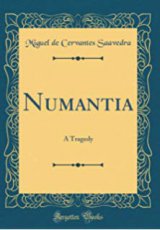The Siege of Numantia Page #5
The Siege of Numantia is a tragedy by Miguel de Cervantes set at the siege of Numantia. The play is divided into four acts. The dialogue is sometimes in tercets and sometimes in redondillas, but for the most part in octaves.
To match the worth and value of your own. Soldier. Two Numantines accredited are here, With solemn message, Scipio, to thee. SCIPIO. What keeps them back? Why do they not appear? Soldier. They wait behind for thy permission free. SCIPIO. Be they ambassadors, their right is clear. Soldier. I judge them so. SCIPIO. Then let them come to me; 'Tis always good the enemy to know, Whether a true heart or a false he show. For Falsehood never cometh in such wise Enwrapped in Truth, that we may not descry Some little cranny in the close disguise, Through which to gaze upon the secret lie. To listen to the foe is always wise, We profit more than we can lose thereby; In things of war experience shows, in sooth, That what I say is well-established truth. Enter the Numantine Ambassadors, First and Second. First Ambassador. If, good my lord, thou grant us without fear To speak the message we have brought this day, Where now we stand, or to thy private ear, We shall deliver all we come to say. SCIPIO. Speak freely, then, I grant you audience here. First Ambassador. With this permission, in such courteous way Conceded to us by thy regal grace, I shall proceed to state our urgent case. Numantia, to whom my birth I owe, Hath sent me, noble general, to thee, As to the bravest Roman Scipio The night e'er covered, or the day can see; And begs of thee the friendly hand to show, In token that thou graciously agree To cease the struggle that hath raged so long, And caused to thee and her such cruel wrong. She says, that from the Roman Senate's law, And rule, she never would have turned aside, Had not some brutal Consuls, with their raw And ruthless hands, done outrage to her pride. With fiercer statutes than the world e'er saw, With greedy lust, extending far and wide, They placed upon our necks such grievous yoke, As might the meekest citizens provoke. Throughout the time, with such a lengthened bound, Wherein both sides have made such cruel sport, No brave commander have we ever found Whose kindness or whose favour we could court. But now, at length, that Fate hath brought it round To guide our vessel to so good a port, We joyfully haul in our warlike sails, Prepared for any treaty--that avails. Nor think, my lord, that it is fear alone Which makes us sue for peace at such an hour; By proofs unnumbered it is widely known That still Numantia wields an arm of power. It is thy worth and valour lure us on, And give assurance that our luck will tower Far higher than our highest hopes extend, To have thee for our master and our friend. On such an errand have we come to-day. My lord, make answer as it pleaseth thee. SCIPIO. Since but a late repentance ye display, Your friendship is of small account to me. Give, give anew the sturdy right arm play, For what mine own is worth I fain would see; Since in its might hath fortune deigned to place My added glory, and your fell disgrace. To sue for peace will hardly recompense The shameless doings of so many years. Let war and rapine come; and in defence Bring out anew your files of valiant spears Second Ambassador. Take heed, my lord; for this false confidence Brings in its train a thousand cheats and fears; And this bold arrogance which thou dost show But nerves our arms to strike a harder blow. Our plea for peace, on which thou now hast frowned, Although we urged it with the best intent, Will make our righteous cause be wide renowned, And Heaven itself will give its blest assent. Mark, ere thou treadest on Numantian ground, Oft wilt thou prove, and to thy heart's content, What bolts of wrath the insulted foe can send, Who wished to be thy vassal, and good friend. SCIPIO. Hast thou aught more to say? First Ambassador. No, we have more To do, since thou, my lord, will have it so. Thou hast refused the just peace we implore, And hast belied thy better self, I know; Soon wilt thou see the power we have in store, When thou hast showed us all thou hast to show, For prating peace away is easier far Than breaking through the serried ranks of war. SCIPIO. Thou speakest truth; and now to make it plain That I can treat in peace, in war command, Your proffered friendship I do now disdain; I here remain the sworn foe of your land, And so with this ye may return again. Second Ambassador. Meanst thou, my lord, on this resolve to stand? SCIPIO. Yes, I do mean it. Second Ambassador. Then, To arms! I say, And no Numantian voice will answer, Nay! [Exeunt the Ambassadors; and QUINTUS FABIUS, brother of SCIPIO, says: QUINTUS FABIUS. Methinks our indolence, which now is past, Hath made you bold within our midst to brawl; But now the wished-for time hath come at last, When ye will see our glory, and your fall. SCIPIO. Vain boasting, Fabius, is beneath the caste Of valiant men, with honour at their call; So calm thy threats, to good persuasion yield, And keep thy courage for the battle-field. Though, sooth, I do not mean that this proud foe Should meet us hand to hand in very deed. Some other way to conquest will I go, Which promises to bring me better speed. I mean to curb their pride, their wits o'erthrow, And on itself to let their fury feed; For with a deep wide ditch I'll gird them round, And hunger fierce will bear them to the ground. No longer shall this soil be coloured red With Roman blood. Sufficient for the State Is what these Spaniards have already shed In this long brutal war, and obstinate. Now bare your arms for other work instead,-- This hard-bound earth to break and excavate; They serve us better, foul with dust and mud, Than when bedabbled with the foeman's blood. Let no one in the ranks this duty shun, But join in strife his neighbour to surpass. Let officer and private work as one, Without distinction, or respect of class. Myself will seize the spade, and when begun Will break the ground as deftly as the mass. Do all as I, and let what will befall, This scheme of mine will satisfy you all. QUINTUS FABIUS. O valiant sir, my brother and my lord, In this we recognize thy prudent care, For it were folly, by the wise ignored,
Translation
Translate and read this book in other languages:
Select another language:
- - Select -
- 简体中文 (Chinese - Simplified)
- 繁體中文 (Chinese - Traditional)
- Español (Spanish)
- Esperanto (Esperanto)
- 日本語 (Japanese)
- Português (Portuguese)
- Deutsch (German)
- العربية (Arabic)
- Français (French)
- Русский (Russian)
- ಕನ್ನಡ (Kannada)
- 한국어 (Korean)
- עברית (Hebrew)
- Gaeilge (Irish)
- Українська (Ukrainian)
- اردو (Urdu)
- Magyar (Hungarian)
- मानक हिन्दी (Hindi)
- Indonesia (Indonesian)
- Italiano (Italian)
- தமிழ் (Tamil)
- Türkçe (Turkish)
- తెలుగు (Telugu)
- ภาษาไทย (Thai)
- Tiếng Việt (Vietnamese)
- Čeština (Czech)
- Polski (Polish)
- Bahasa Indonesia (Indonesian)
- Românește (Romanian)
- Nederlands (Dutch)
- Ελληνικά (Greek)
- Latinum (Latin)
- Svenska (Swedish)
- Dansk (Danish)
- Suomi (Finnish)
- فارسی (Persian)
- ייִדיש (Yiddish)
- հայերեն (Armenian)
- Norsk (Norwegian)
- English (English)
Citation
Use the citation below to add this book to your bibliography:
Style:MLAChicagoAPA
"The Siege of Numantia Books." Literature.com. STANDS4 LLC, 2024. Web. 24 Nov. 2024. <https://www.literature.com/book/the_siege_of_numantia_60>.




Discuss this The Siege of Numantia book with the community:
Report Comment
We're doing our best to make sure our content is useful, accurate and safe.
If by any chance you spot an inappropriate comment while navigating through our website please use this form to let us know, and we'll take care of it shortly.
Attachment
You need to be logged in to favorite.
Log In